| dc.contributor.author | Koilo, Viktoriia | |
| dc.contributor.author | Grytten, Ola Honningdal | |
| dc.contributor.author | Emblemsvåg, Jan | |
| dc.date.accessioned | 2023-03-06T12:08:44Z | |
| dc.date.available | 2023-03-06T12:08:44Z | |
| dc.date.created | 2022-09-28T23:04:49Z | |
| dc.date.issued | 2022 | |
| dc.identifier.citation | Problems and Perspectives in Management. 2022, 20 (3), 448-464. | en_US |
| dc.identifier.issn | 1727-7051 | |
| dc.identifier.uri | https://hdl.handle.net/11250/3056028 | |
| dc.description.abstract | It is assumed that technological progress plays a vital role in energy efficiency improvements when the effects of industrial restructuring, infrastructure, environmental challenges, and economic shocks seem more dubious. However, a limited number of studies have been conducted to examine the impact of technological innovation on countries’ energy efficiency levels. This study aims to explore the relationship between energy efficiency, technological innovation, and economic growth in 30 European countries by utilizing data from 2012 to 2020. To this end, a two-stage analysis is carried out. The first step involves estimating the total factor energy efficiency (TFEE) by the countries to illustrate the effects of energy parameters on economic growth and the environment, and technological innovation (TI) to estimate the innovation capability of each country by using data envelopment analysis (DEA) methodology. The second step includes a panel regression model to explore how technological innovation affects energy efficiency, considering the degree of government intervention, industrial structure, infrastructure, and economic openness.
The results indicate that the bottom-15 countries, whose TFEE scores were the lowest, are mainly countries of Central and Eastern Europe. Regarding the countries’ technological capability, the results were similar, but the score was lower than the TFEE.
Moreover, the regression analysis shows that a one percent increase in innovation activity contributes to an increase in energy efficiency by 0.27 percent. Hence, it confirms the notion of a positive impact of new technology on energy efficiency. | en_US |
| dc.language.iso | eng | en_US |
| dc.publisher | Limited Liability Company “Consulting Publishing Company “Business Perspectives” | en_US |
| dc.rights | Navngivelse 4.0 Internasjonal | * |
| dc.rights.uri | http://creativecommons.org/licenses/by/4.0/deed.no | * |
| dc.title | The interplay between technological innovation, energy efficiency, and economic growth: Evidence from 30 European countries | en_US |
| dc.title.alternative | The interplay between technological innovation, energy efficiency, and economic growth: Evidence from 30 European countries | en_US |
| dc.type | Peer reviewed | en_US |
| dc.type | Journal article | en_US |
| dc.description.version | publishedVersion | en_US |
| dc.source.pagenumber | 448-464 | en_US |
| dc.source.volume | 20 | en_US |
| dc.source.journal | Problems and Perspectives in Management | en_US |
| dc.source.issue | 3 | en_US |
| dc.identifier.doi | 10.21511/ppm.20(3).2022.36 | |
| dc.identifier.cristin | 2056626 | |
| dc.relation.project | Norges forskningsråd: 237929 | en_US |
| cristin.ispublished | true | |
| cristin.fulltext | original | |
| cristin.qualitycode | 1 | |

